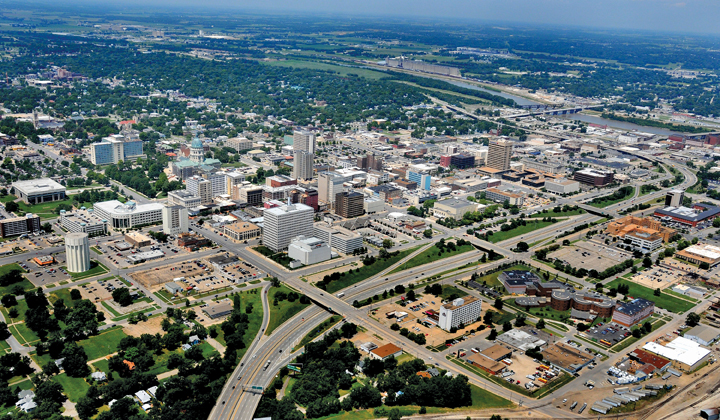“You can’t be plain vanilla and win.”
With those words, Steve Jenkins captures not only the essence of
As senior vice president of economic development for The Greater Topeka Chamber of Commerce/GO Topeka, Jenkins has seen firsthand the entrepreneurial innovation that has propelled many
The state’s capital city is a key player in that ascendancy, according to a number of corporate executives presiding over facility expansion projects in the 230,000-resident Greater Topeka area that spans five counties.
“We are not sitting back and amassing funds for that one big deal that might come along,” says Jenkins. “Rather, we know that we have to have the assets in place that attract the attention of growing companies.”
One of those assets is a plethora of rail sites, a byproduct of
The railroads, long an important component of
PTMW acquired the 800,000-sq.-ft. (74,320-sq.-m.) complex for an undisclosed price and plans to invest another $4.25 million into converting the warehouse into a manufacturing plant. Upon full production, the firm could hire 140 new workers to add to the 160 people currently employed in
The company is growing due to rising demand for its signal houses. The Federal Railroad Administration increased that demand when it passed a regulation mandating “positive train control” by Dec. 31, 2015, for all railroad systems where human life may be at risk. The regulation will prevent collisions by implementing an external braking control system thereby monitoring and maintaining a safe distance between passenger trains.
Ed Carpenter, vice president of external affairs for PTMW, tells Site Selection that the company expects to triple its signal house production over the next five years. PTMW currently builds 2,500 to 4,000 signal houses per year. By 2015, that number could reach 12,000 to 15,000, says Carpenter.
Chamber Helped Resolve Impasse
Acquiring the former Payless plant makes that expansion possible, says Carpenter, the executive who negotiated the real estate deal for PTMW. “We needed more space, equipment and workers to supply our railroad customers with the products they need in order to meet this new regulation,” he says. “We were fortunate that the Payless facility became available and we were able to negotiate a fair price for it.”
Patti Goff, president and owner of PTMW and winner of the Kansas Department of Commerce’s 2009 Woman-Owned Business of the Year award, says, “the former Payless distribution center is an ideal facility to support our near- and long-term growth plans. It has large open spaces, wide column spacing and high ceilings. It permits great flexibility in terms of use and applications for our business.”
Goff says the new plant will enable PTMW to “branch out into the facilities market. We do a lot of work for Union Pacific Railroad in
Carpenter credits Topeka Chamber/GO Topeka with expediting the expansion. “Significant incentives were provided to the company for the projected new employment,” he says. “We reached an impasse with the seller during negotiations, and the Chamber helped resolve that. The State of
Carpenter says PTMW likes the
He also cites the “good transportation systems of
Logistics Assets Attract Firms
Those transportation assets are a big reason why Frito-Lay Inc. selected
Frito-Lay is modifying its
The project retains 40 jobs that otherwise would have been lost with the implementation of new packing technology. It also provides additional training and a boost in wages for the workers.
Home Depot is opening a 465,500-sq.-ft. (43,245-sq.-m.) distribution center that creates 300 jobs over the next few years. The $25-million
Transportation assets are also attractive to makers of transportation equipment. The Goodyear Tire & Rubber Company announced a $250-million manufacturing plant investment that retains 1,400 jobs in
“It is basically a modernization of our off-highway business which includes investment into manufacturing of a 63-inch tire,” says Tim Davis, plant manager for Goodyear in
This investment profile was prepared under the auspices of the Greater Topeka Chamber of Commerce/GO Topeka. For more information, contact Steve Jenkins at 785-234-2644 or by e-mail at sjenkins@TopekaChamber.org. On the Web, go to www.TopekaChamber.org.
